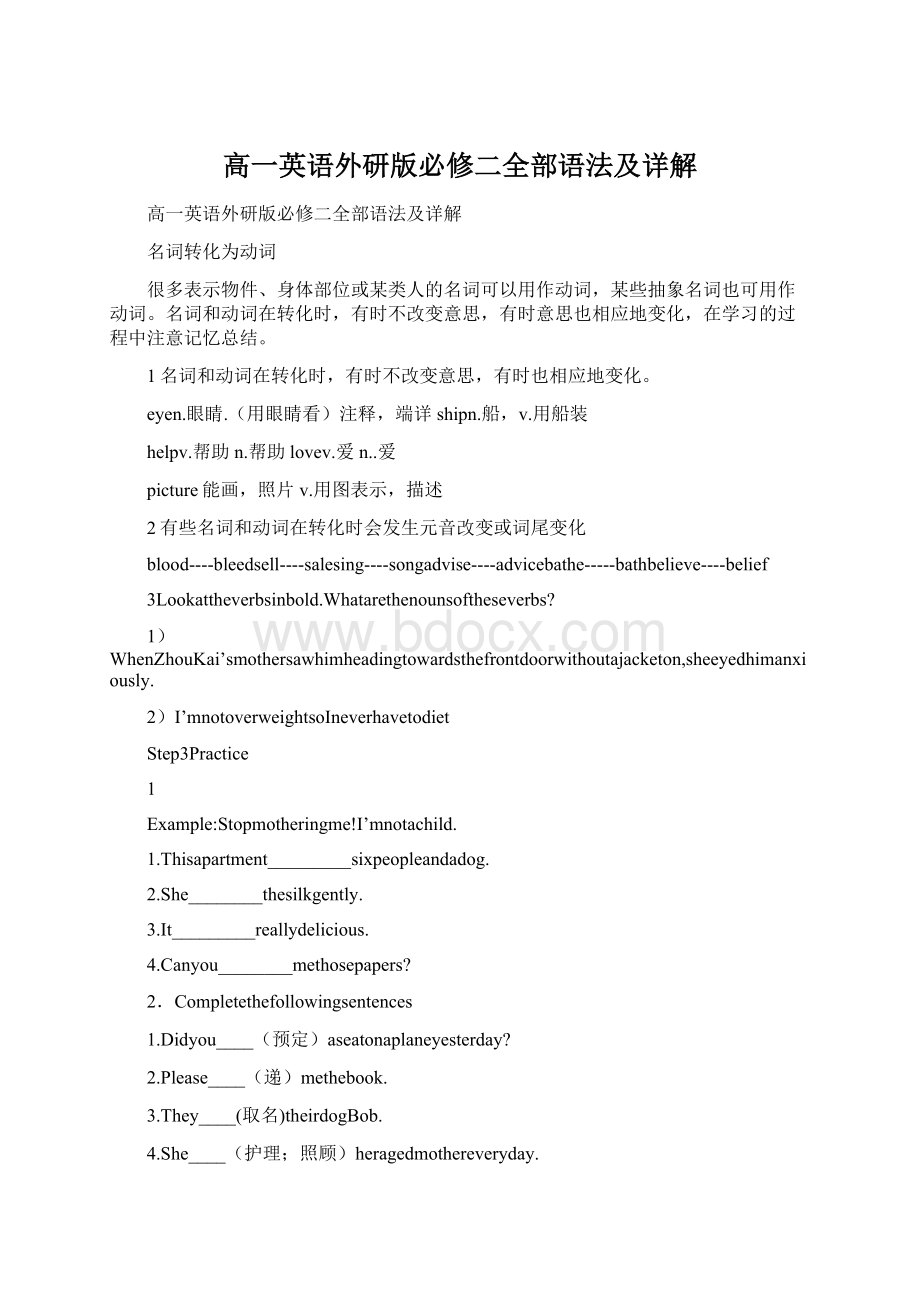高一英语外研版必修二全部语法及详解.docx
《高一英语外研版必修二全部语法及详解.docx》由会员分享,可在线阅读,更多相关《高一英语外研版必修二全部语法及详解.docx(14页珍藏版)》请在冰豆网上搜索。

高一英语外研版必修二全部语法及详解
高一英语外研版必修二全部语法及详解
名词转化为动词
很多表示物件、身体部位或某类人的名词可以用作动词,某些抽象名词也可用作动词。
名词和动词在转化时,有时不改变意思,有时意思也相应地变化,在学习的过程中注意记忆总结。
1名词和动词在转化时,有时不改变意思,有时也相应地变化。
eyen.眼睛.(用眼睛看)注释,端详shipn.船,v.用船装
helpv.帮助n.帮助lovev.爱n..爱
picture能画,照片v.用图表示,描述
2有些名词和动词在转化时会发生元音改变或词尾变化
blood----bleedsell----salesing----songadvise----advicebathe-----bathbelieve----belief
3Lookattheverbsinbold.Whatarethenounsoftheseverbs?
1)WhenZhouKai’smothersawhimheadingtowardsthefrontdoorwithoutajacketon,sheeyedhimanxiously.
2)I’mnotoverweightsoIneverhavetodiet
Step3Practice
1
Example:
Stopmotheringme!
I’mnotachild.
1.Thisapartment_________sixpeopleandadog.
2.She________thesilkgently.
3.It_________reallydelicious.
4.Canyou________methosepapers?
2.Completethefollowingsentences
1.Didyou____(预定)aseatonaplaneyesterday?
2.Please____(递)methebook.
3.They____(取名)theirdogBob.
4.She____(护理;照顾)heragedmothereveryday.
一般将来时(Thefuturesimpletense)
1.一般将来时表示将要发生的动作或存在的状态
Zhoukai,you’llgetill.
I’llbuyyouatoy.
Mysister’sgoingtoseeyouoff.
will和begoingto都可以用来表达将要发生的事情,区别如下:
(1).单纯谈到将来的事情,没有主观因素,可用will.
Itwillbecomewarmwhenspringcomes.春天到来,天气将会变暖。
Iwillbetwentynextmonth.下个月我就20岁了。
(2).表示说话人的推测,用will.
Shewillbeallrightaftertakingthemedicine.吃了这药,她就会好的。
Thatwillbeyourhouse.那是你的家吧。
(3).表示一种倾向,用will.
EachtimehecomestoBeijing,hewillvisittheGreatWall.每次他来到北京,他都要游览长城。
Withoutwater,manwilldie.没有水人会死。
(4).表示说话时决定马上要做的动作(多半是听了对方的话后所做出的反应),用will.
A:
MychesthurtswhenIbreathe.我呼吸时,胸部疼痛。
B:
Liedownplease,andI’llexamineyou.请躺下,我给你检查一下。
(5).表示经过事先考虑或安排后的意思,即―打算做某事‖,用goingtodo.
Myfriendisinhospitalnow,butheisgoingtocomeouttomorrow.我朋友现在医院,但是他明天就要出院了。
Shehasborrowedsomebooksfromthelibrary.Sheisgoingtomakeacarefulstudy.她从图书馆借了一些书。
她打算好好作番研究。
(6)在口语中,表示将要发生的事情时,多用begoingto.
What’sgoingtohappen?
将要发生什么事?
Istheregoingtobeapartytomorrowevening?
明天晚上有聚会吗?
(7)表示根据已有的、并被注意到的迹象将要发生的事情
Theyaregoingtomissthetrain.他们要赶不上火车了。
(说话者注意到他们出发时已经太晚了)Lookatthosedarkclouds;it’sgoingtorain.看那些乌云,要下雨了。
(8).begoingto可用于表示将来时间的条件状语从句,will却不能。
Ifheisgoingtoparticipateinthecompetition,he’dbettergetprepared.如果他打算参加这个竞赛,他做好准备。
Ifwearegoingtostartearly,5o’clockisok.如果我们计划早出发,5点就可以。
(9).will可用于表示意愿、拒绝等的条件状语从句中。
IfTomwon’tcome,wewilllosethegame.如果汤姆不愿意来,我们将输掉这场比赛。
Ifhewilldosomethinguseful,hewillsavetheboy.如果他愿意做些有益的事,他会就这个男孩的。
Practice
1.JimandLiLei__________(watch)thefootballmatchthisevening.
2.Wearegoingtoplayping-pongonSaturday.(改为一般疑问句并作否定回答)
—____________________goingtoplayping-pongonSaturday?
—__________,we__________.
3.我叔叔今晚要来。
Myuncle______________________________.
4.我们要讨论这本书。
We_____________________________thisbook.
5.---DoyoutellJuliaabouttheresult?
---Oh,no,Iforgot.I______hernow.
A.willbecallingB.willcallC.callD.amtocall
6.Lookatthedarkcloudsinthesky.Ithinkit_____rain.
AwillBshallCmustDisgoingto
7.Ifhe____beheadteacherofthisclass,Iwillnotgotothisclass.
AisgoingtoBwillCwastoDshould
8.----Writetomewhenyougethome
----____.
A.IamgoingtoB.IwillC.IshouldD.Ican
9.That____beDr.Wang’sclinic.Let’sgoandhavealook.
A.isgoingtoB.willC.isnotgoingtobeD.willnot.
10.Myyoungerbrother____be15yearsoldnextyear.
A.isgoingtoB.willC.istoD.should
11.Let’skeeptothepointorwe_____anydecisions.
A.willneverreachB.haveneverreached
C.neverreachD.neverreached
12---You’veleftthelighton.
---Oh,soIhave._______andturnitoff.
A.I’llgoB.I’vegoneC.IgoD.I’mgoing
13.Ifhe_____tocollege,he_____alotmore.
A.willgo;willlearnB.willgo;isgoingtolearn
C.goes;willlearnD.goes;isgoingtolearn
14.---Sorry,Iforgottoposttheletterforyou.
---Nevermind,_____postitmyselftonight.
A.I’mgoingtoB.IprefertoC.I’llD.I’drather
15.---Writetomewhenyougethome.
---____________.
A.ImustB.IshouldC.IwillD.Ican
语法项目
1.不定式作状语
1)不定式作目的状语:
Hebrokeintothehousetostealsomething.
Manydrugaddictsarenowintreatmentcentrestostoptakingdrugs.
He'ssavinguptobuyanewcar.
Heusesacomputertosendemails.
2)有时候在不定式前面加上inorderto或soasto,否定式为inordernotto和soasnotto:
Let'shurrysoastogotoschoolintime.
Let'shurrysoasnottobelateforschool.Shestudiedveryhardinordertocatchupwithothers.
Shestudiedveryhardinordernottolagbehind.
3)不定式表示目的时,通常它的逻辑主语就是句子的主语,但如果不是的话,就要用for…结构表示逻辑主语,如:
MomopenedthedoorforJaneandBettytocomein.
Wearenowusingtheseries―NewStandardEnglish‖forstudentstomakegreatprogress.请注意以下结构:
Itissokindofyoutocomeandhelpus.
(这时,you既是tocomeandhelpus又是kind的逻辑主语)
再如:
It'srudeofhimtosayso.
4)不定式还可以作结果或原因状语:
表结果:
WhathaveIdonetogetallthis?
Shewentabroadnevertoreturn.
Hewasso.lateastomisshalfofthelecture.
Sheissuchagoodstudentastoberespectedbyallherclassmates.
Thehouseislargeenoughtoholdtwohundredpeople.
Heistooyoungtodothejob.
表原因:
ShewassurprisedtoseeusinthestreetofLondon.
Helaughedtohearthenews.
Theoldladyrejoicedtolearnthathersonwasthechampionofthematch.
2.so…that…和such(a,an)…that…引导的结果状语从句
1)so…that…和such(a,an)…that…都引导结果状语从句,如:
Someofthembehavesobadlythatpeoplecallthepolice.
Itwassuchadangerousdrugthathenearlydied.
Itwassuchloudmusicthatwecouldn'thearourselvesspeak.
2)so的后面跟形容词或副词:
Thenightsceneofthelakewassobeautifulthatwedidn'twanttocomebackatall.Theyplayedsohappilythattheyforgotthetime.
3)such(a,an)后面跟名词:
Theyweresuchdangerousdrugdealersthatpeoplehadtoaskthepoliceforhelp.Itissuchaninterestingstorythatallofthemlikeit.
4)请注意本模块语法项目1.4中讨论的某些不定式作结果状语的句子:
Hewassolateastomisshalfofthelecture.
Sheissuchagoodstudentastoberespectedbyallherclassmates.
Thehouseislargeenoughtoholdtwohundredpeople.
Heistooyoungtodothejob.
我们可以把它们改变成结果状语从句:
Hewassolatethathemissedhalfofthelecture.
Sheissuchagoodstudentthatsheisrespectedbyallherclassmates.
Thehouseissolargethatitcanholdtwohundredpeople.
Heissoyoungthathecan'tdothejob.
a.Nowcompletethesentenceswithso,asaresultorasaresultof.
1.Adamknewthattakingdrugswasbad,_________hestopped.
2.Hestoppedtakingdrugs________meetingthedoctor.
3.Adammetadoctorwhoexplainedtheproblem.__________hestoppedtakingcocaine.
4.Crackcocaineisveryaddictive,________userscannoteasilystopusingit.
5.Hewasextremelyill_________takingcrackcocaine.
6.Hebecameaddictedtocrackcocaine,_________hebecameveryill.
时间状语从句
时间状语从句主要用于说明主句动词的时间,其类型颇多详见如下归纳。
1.When引导的时间状语从句,意为―当……的时候‖,when的从句可以用延续性动词。
HewasworkingatthetablewhenIwentin.当我进去的时候,她正在桌旁工作。
IwaswatchingTVwhenhecame.他来的时候我正在看电视。
注意:
when也可以作并列连词,表示一个动作即将或正在进行或刚完成的时候,突然发生了另一件事。
Iwasabouttoleavewhenthetelephonerang.我正要离开,这是电话铃响了。
Wewereworkinginthechemistrylab,whenthelightswentout.
我们正在化学实验室工作,突然灯熄灭了。
Ihadjustgonetosleepwhentherewasaknockatthedoor..我刚入睡就有人敲门
2.While引导的时间状语从句,表示―与……同时,在……期间‖。
While的从句中常用延续性动词或表示状态的词。
Theyrushedinwhilewewerediscussingproblems.当我们正在讨论问题时,他们冲了进来。
FatherwascleaningthecarwhileIwasplayingcomputergames.
当我正在玩电子游戏时,爸爸在清洗汽车。
注意:
while还可以表示对比意义,意为―而;却‖。
例如:
Janewasdressedinblue,whileMarywasdressedinred.
珍妮穿着蓝色的衣服,而玛丽穿红色的。
3.As引导的时间状语从句,作―当……的时候,一边……一边‖―随着----‖解,as的从句中可使用延续性动词,也可使用非延续性动词。
例如:
Hesangashewasworking.他一边工作一边唱歌。
Astimegoesby,wehaveabetterunderstandingofthingsaroundus.
随着时间的推移,我们对自己周围的事务有了更好的理解。
4.Before和after引导的从句:
前者一边表示主句的动作发生早从句的动作之前;后者表示主句的动作发生在从句的动作之后。
例如:
Ididn’tknowanyEnglishbeforeIstartedschool.我上学之前,一点英语都不懂Ihadcookedsupperbeforemyparentscameback.我父母回来之前,我就做好了晚饭。
Itwon’tbelongbeforewemeetagain.我们不久就能见面。
Afterhecameout,helockedthedoor.他出来后,就锁上了门。
5.Since和eversince引导的从句:
表示―自从……以来‖,从句一般表示动作的起点,用过去时。
主句表示动作延续的情况,一般用现在完成时或现在完成进行时。
如果主句表示的是时间,主句可用一边现在时,也可用现在完成时。
现在完成时(延续性动词)…since+…过去时(非延续性动词)―自从……以来‖
现在完成时(延续性动词)…since+…过去时(延续性动词)―自(延续性动词结束以来……‖Sincehecamehere,hehasmadealotoffriends.他来这里以后,已交了许多朋友。
Hehasbeenworkinghereeversinceheleftuniversity.
自从大学毕业以后,他就一直在这里工作。
Shehaslivedalonesinceherhusbanddied.自丈夫去世后她就一直独自生活。
IhavebeenwearingglassessinceIwasthree.我三岁以后一直戴眼镜。
Itistenyearssincehesmoked.他戒烟十年了
语法二过去完成时
过去完成时由助动词had加过去分词构成,主要表示在过去某时之前已发生的动作或情况,也可以说时―过去时间的过去‖。
其被动形式为―had+been+p.p‖例如:
Bytheendoflastterm,wehadlearnedmorethan3,000Englishwords.
到上个学期末为止我们已经学了3000多个单词了。
注意:
如果句中出现了表示过去的具体时间状语,句子的内容可为过去的实际情况或句子中的内容为历史事实时,句中的动词时态只能用一般过去时。
例如:
TheteachersaidthatitwasColumbuswhofirstdiscoveredtheAmericancontinent.
在表示某人过去未曾完成的―心愿,打算,计划,想法,许诺‖等等时,hope,mean,plan,want,promise,intend等位于动词必须用过去完成时。
例如:
Ihadplannedtoofferyousomehelpinyourshop,butsuddenlymymotherfellillyesterday.昨天我原本计划在你的店里帮一些忙的,但是我妈妈突然病了。
HehadhopedtospendtheimportantdaywithuslastSunday,buthewastoobusythen.上星期他原本很想与我们一起度过这个重要的日子,可是他当时实在太忙了
1、通过讨论下列例题复习时间状语从句
1)—Whendidheleavetheclassroom?
—Heleft_____youturnedbacktowriteontheblackboard.
A.thetimeB.themomentC.untilD.since
2)—Haveyouknowneachotherforlong?
—Notvery,________westartedtoworkintheABCMotorCompany.
A.beforeB.sinceC.whenD.after
3)Ididn’tmakegreatprogressinmyEnglishstudy_____myteacherhadgivenmesomeadviceonhowtolearnthelanguagewell.A.unlessB.beforeC.untilD.when
4).Thatwasreallyasplendidevening.It’syears_____Ienjoyedmyselfsomuch.
A.whenB.thatC.beforeD.since
5)—DidJackcomebackearlylastnight?
—Yes.Itwasnotyeteighto’clock____hearrivedhome.
A.beforeB.whenC.thatD.until
2、通过讨论下列例题归纳出because,as,since,for的用法区别以及nowthat的用法。
6)____You’vegotachance,youmightaswellmakefulluseofit.
A.NowthatB.AfterC.AlthoughD.Assoonas
7)Hefounditincreasinglydifficulttoread,____hiseyesightwasbeginningtofail.
A.thoughB.forC.butD.so
8)—DidyoureturnFred’scall?
—Ididn’tneedto______I’llseehimtomorrow.
A.thoughB.unlessC.whenD.because
9)________youknowit,Iwon'trepeatit.
A.ForB.BecauseofC.SinceD.Till
10)—MayIgoandplaywithDickthisafternoon,Mum?
—No,youcan’tgoout_______yourworkisbeingdone.‖
A.beforeB.untilC.asD.themoment
because,as,since,for归纳:
_________________________________________________________________________
3、通过用不同的句型翻译该句,复习so/such……that等引导的状语从句。
他是一个如此可爱的男孩,以至于人人都非常喜欢他。
________________________________________________________________.
________________________________________________________________.
________________________________________________________________.
典例评析:
1.________everyoneelsewouldn’tgotothemountainarea,hewentwithoutasecondthought.
A.AslongasB.WhileC.WhereD.Inspiteof
2.—AreyoureadyforSpain?
—Yes,Iwantthegirlstoexperiencethat_____theyareyoung
A.whileB.untilC